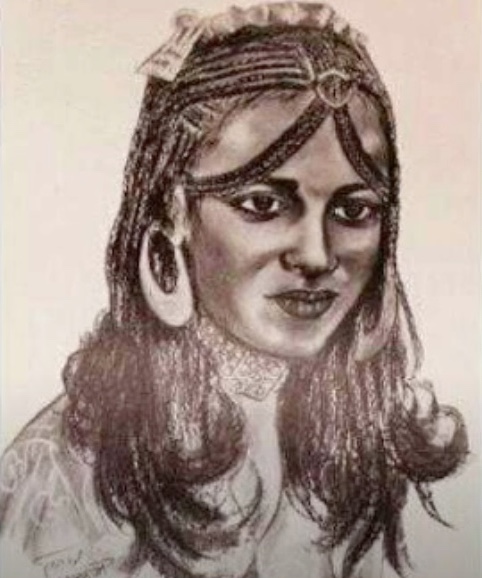Women in Arka Saber’s Songs

Looking at Arka Saber’s poetic copious productivity, it would be difficult to confine all the topics that will be analysed in one or two articles. Due to the extensive and essential issues that touch humanitarian areas at different levels, this article will discuss the characterisation of women in Arka’s songs, one of the most important issues in his songs and analyse the reasons behind accepting its clauses. Other topics will be discussed in the coming articles, respectively.
Beja women have been on the battlefield since the first Beja wars from 1880s to 1890s defending their land. That was documented by some writers who were orally producing poetry specifying the role of Beja women, who were backed their husbands and brothers in critical battles against the Turkish and English Empires by serving the fighters and helped with other essential logistics including encouraging the fighters – similar to what other Sudanese women did in striving against the two empires, such as Muhira Bint Aboud and others who had heroic history to preserve their homelands.
Throughout history, Beja women did not limit their job only at looking after children at homes; however, they accompanied the men in annual twice travels in the summer and rainy seasons searching for pasture and water. Therefore, they were characterised by agility and strength as well as being modest. Not only that, but they were not even easily reachable, because the poets who described the Beja women found it difficult to meet them; therefore, they were forced to express themselves by naming the valleys and the places in which they were lived.
“Art Raweiw” /jǝrti reiw/
| Lines in Bejawiet | Arabic translation | English translation | Transcription |
| افرهيتيت افرهسين انديرودور اريت علمين يهمدايياخلاق دربين جالسييكيا يأرت ريو اسكبير وأراو | البجاويات سعيدات ويسعدن رفقائهنويعلمهن الشهامةويدربهن للاخلاق في مجالستهنالبنات يكبرن رفاقائهن | Happy female Beja fighters make their mates happy,)and) teaches magnanimity,they train for ethics in meetings,they grow up mates. | /ǝf-rhi:t ǝfrh-sein inǝ-di:rǝu//du:r-ǝr-reit ǝl-lǝ-mein jh-m?ǝ-ḑǝ-hei//ǝkh-lᴂq dǝr-rǝ-bein ʤǝ-lǝ-sei-nei-k//jǝ wǝrti reiw is-kǝ-bi:r wǝ-rᴂ-wɔ:/ |
| أوجيش تقلين ناضليتيتفدني دابي اندي تك دور اريسينهبنما استرين يهنكولايي يا يأرت ريو اسكبير وأراو | دعمن جيش البجا في المعارك و اعاقن من اراد الفرار وفي الانتصارات ثبتوهم البنات يكبرن رفاقائهن | Supported the Beja army in the battles and hindered who wanted to flee, (and) in victories, stabilised them, girls grown mates | /ɔ:- ʤ-eiʃ tǝq-qǝ-lein nǝ-dǝ-lei-ti:t//fdni dᴂbi indi tek du:r-ǝrei-sei-n//hǝb-nǝ-mǝ ǝs-ti-rein jehn-kw-lᴂ-jei//jǝrti reiw is-kǝ-bi:r wǝ-rᴂ-wɔ:/ |
| كاكيب ايتكوين فصليتيتمنظر هوي اكتين اوكلاشنكمرات القين اكتفيوهباركي صورين هاجمينك | كانوا يرتدين الكاكي العسكري ،وتجملن بالكلاشينكوف ،وعليقن الكاميرات على اكتافهن ، والتقطو صوراً لما هاجم الجيش من دون خوف | They were in uniforms, and beautify by Kalashnikov with cameras’ hung over their shoulders, they capture photos of battles without fear | /kǝ-ki:b eit-kwi:n fǝ-sǝ-lei-ti:t//mʌn-zǝr hɔi ikǝ-ti:n uki-lᴂ-ʃin/ /Kǝ-mi-rᴂt ǝl-lǝ-qein ikǝt-fei-jɔh//bᴂ-rǝkwi: sǝw-wǝ-rein hᴂ-ʤǝ-mi:-neik/ |
| مهندسات اكتين اقريينيكدكتورات اكتين حضرنيكتري هوي سيسين شهدايييا يأرت ريو اسكبير وأراو | هن مهندسات اذا تخرجنأو الطبيبات مؤهلات ،لكنهن يقيسون أي شهادة أولى “الأكاديمية أو من أجل الوطن”البنات يكبرن رفاقائهن | Engineers if they graduated (or) qualified doctors, but they measure whichever certificate priories “the academic or sake for the homeland” (they) grow up mates. | /mehn-di-sǝt ikǝ-ti:n ǝq-ri-jei-neik//dik-tɔ:-rᴂt ikǝ-ti:n hǝd-dǝ-rei-neik//tǝri- hɔi- sǝj-jǝ-sein ʃu-hǝ-dǝb//jǝrti reiw is-kǝ-bi:r wǝ-rᴂ-wɔ:/ |
Arka confessed that the women who joined the Beja army under the name of the Beja Congress were strong and brave fighters. They were also happy to play that role, which had a positive impact on the fighters and reinforced confidence among the comrades in the battles. Arka also reported that the female fighters equipped men with magnanimity and trained them to acquire perfect morals when they met in post battle discussions. Therefore, he thinks that the girls are the ones who grew up as their accompanies.
The support that Beja women fighters offered to the army was not only limited to battlesland and pushing fighters forward, but at the psychological level, they had injected any possible weaknesses, which could be an opportunity to flee from the battleground. During the battles, they provided the fighters with the energy and magnanimity they needed until they were able to steadfastness and succeed in victories. Therefore, Arka still believes that girls are the ones who grow up as their accompanies.
One of the most amazing pictures that Arka used for documenting the role of the female fighters of the Beja Congress was when they were shown wearing military uniforms and beautify themselves by hanging Kalashnikovs on their backs in a state of complete readiness to fight on the battlefield. In addition, they hanged cameras on their shoulders in order to document these battles. Arka confirmed that the female fighters attended the battles and took photos of these battles without fear.
In a quick review of the Beja women fighters academic success beside their concerns about the reasons their fighting, Arka asserted that these fighters were neither from those who were missed education nor from those who were failed in academic, but they were successful engineers if they graduated or qualified female doctors if they completed their studies and attend postgraduate studies. Therefore, they studied the two cases, which were about continuing to study at the universities or joining the Beja female army, in order to decide to which they can give priority. They had constructive assessment and came up with a conclusion that they would never benefit from their education if they lost their land and if they graduated there won’t be able to get job opportunities. Therefore, they reassessed the two cases and went for the military option.
In the second line in “Oaki-tab” song, which means ‘the book’, referring to the Holy Quran, Arka has referred again to male and female university students, who joined the Beja army and their roles in the camps. This confirms that female Beja fighters were in the battlefield. As the meaning of the two lines of the poem clarify, those who were in the army didn’t care about whatever can occur and they didn’t change their decision about the issue for which they joined the Beja army even if they lost everything and life opportunities.
“Oaki-tab”
| Lines in Beja | Arabic translation | English translation | Transcription |
| كُاب ربانايي ارريو تجامعاتيارجمعا بادييب اوبجايت قضييايتيطلباب قادفين باركوين نبري | لدينا طلاب جامعيين ذكور واناثلا يترددون عن قضية البجالدينا طلاب مجازفين ولا يخافون | We have both male and female university studentsin spite of being at risk, they do not hesitate,. | /kwᴂb rǝ-bᴂb ǝr-reiw ti-ʤǝ-m?ǝ-ti//ǝr-ʤǝ-mǝ bᴂdi:n tu-qǝ-di-jǝi-ti://tǝ-lǝ-bǝb qǝ-dǝ-fein bǝ-rǝ-kwi:n ni-bǝ-ri/ |
This article discusses one of the many important issues in Arka’s songs, which is about the presence of the Beja female fighters in the army and their roles in the camps. Arka confirmed that the female fighters accompanied their colleagues in the battle lands and they were actively participated in the battles, whether they were inside or outside of the camps. He also hinted at their academic success and achievement they awarded in the highest academic ranks in Sudanese universities.
The limitation of this article was only based on information from only two poems from the rich literature that Arka produced; however, I was not able to access them all. I was informed that his written versions of songs are with one of his relatives that I hope to get a copy of, so that I can extend with more details and examples.

Dr Hassan Adrob is a Sudanese based in Oman and works as an English language and Linguistic lecturer and a teacher trainer at Red Sea University and Sohar University. His MA and PhD are in Applied Linguistics. Dr Hassan is a qualified CELTA instructor and has participated in an accredited IELTS Training Programme. He fulfilled the twin duties of lecturer in English and skills leader. Dr Hassan is a regular participant at conferences and has recently published three books with Eliva Press.
Related posts:




